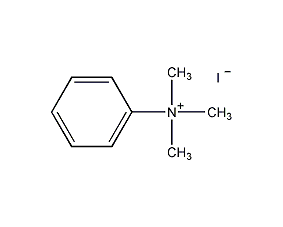Phenyltrimethylammonium iodide

Structural formula
| Business number | 02D5 |
|---|---|
| Molecular formula | C9H14IN |
| Molecular weight | 263.12 |
| label |
Trimethylphenylammonium iodide, Phenyltrimethylamine iodide, (CH3)3N(I)C6H5, N,n,n-trimethylaniliniumiodide, N,n,n-trimethyl-benzenaminiuiodide, N,n,n-trimethylbenzenaminiiumiodide, N,n-dimethylanilinemethiodide, Phenyltrimethyl-ammoniodide, Trimethylanilliniumiodide, Trimethylphenyl-ammoniuiodide, Phenyltrimethylammonium iodide |
Numbering system
CAS number:98-04-4
MDL number:MFCD00011791
EINECS number:202-630-3
RTECS number:BT2450000
BRN number:3916752
PubChem number:24849650
Physical property data
1. Appearance: white powder.
2. Density (g/mL,25℃): Undetermined
3. Relative vapor density ( g/mL,Air =1): Undetermined
4. Melting point (ºC): 227
5. Boiling point (ºC,normal pressure): Undetermined
6. Boiling point (ºC, kPa): Not determined
7. Refractive index: Undetermined
8. Flashpoint (ºC): Undetermined
9. Specific optical rotation (º): Undetermined
10. Autoignition point or ignition temperature (ºC): Undetermined
11. Vapor pressure (mmHg, 55ºC): Undetermined
12. Saturated vapor pressure (kPa, 25 ºC): Not determined
13. Heat of combustion (KJ/mol): Undetermined
14. Critical temperature (ºC): Undetermined
15. Critical pressure (KPa): Undetermined
16. Oil and water (octanol/Log value of the partition coefficient (water): undetermined
17. Explosion upper limit (%,V/V): Undetermined
18. Lower explosion limit (%,V/V): Undetermined
19. Solubility: Undetermined
Toxicological data
Acute toxicity: Mouse peritoneal cavity LD50: 55mg/kg;
-US; mso-fareast-language: ZH-CN; mso-bidi-language: AR-SA”>Mouse subcutaneous LD50: 85mg /kg;
MouseIntravenous injectionLD50:5620μg/kg;
Ecological data
This substance is slightly harmful to water.
Molecular structure data
None
Compute chemical data
1. Reference value for hydrophobic parameter calculation (XlogP):
2. Number of hydrogen bond donors: 0
3. Number of hydrogen bond acceptors: 1
4. Number of rotatable chemical bonds: 1
5. Number of tautomers:
6. Topological molecular polar surface area (TPSA):0
7. Number of heavy atoms: 11
8. Surface charge: 0
9. Complexity: 95.8
10. Number of isotope atoms: 0
11. Determine the number of atomic stereocenters: 0
12. The number of uncertain atomic stereocenters: 0
13. Determine the number of stereocenters of chemical bonds: 0
14. Uncertain number of chemical bond stereocenters: 0
15. Covalent bond unit�Quantity: 2
Properties and stability
Avoid contact with oxidants and light.
Storage method
Stored in a cool, ventilated warehouse. Keep away from fire and heat sources. should be kept away from oxidizer, do not store together. Store in dark place. Use explosion-proof lighting and ventilation facilities. Do not use sparks easily
machinery, equipment and tools. The storage area should be equipped with emergency release equipment and suitable containment materials.
Synthesis method
None
Purpose
None
extended-reading:https://www.newtopchem.com/archives/830extended-reading:https://www.newtopchem.com/archives/933extended-reading:https://www.bdmaee.net/polyurethane-rigid-foam-catalyst-cas15875-13-5-jeffcat-tr-90/extended-reading:https://www.newtopchem.com/archives/40263extended-reading:https://www.newtopchem.com/archives/683extended-reading:https://www.bdmaee.net/dioctyltin-dilaurate-dotdl/extended-reading:https://www.newtopchem.com/archives/44045extended-reading:https://www.bdmaee.net/n-formylmorpholine-cas4394-85-8-4-formylmorpholine/extended-reading:https://www.bdmaee.net/low-odor-catalyst-9727/extended-reading:https://www.bdmaee.net/2-4-6-trisdimethylaminomethylphenol/

